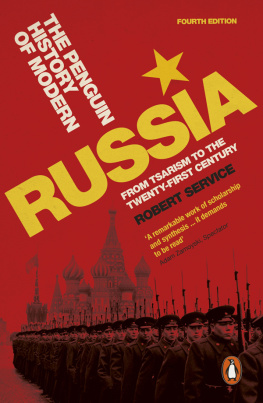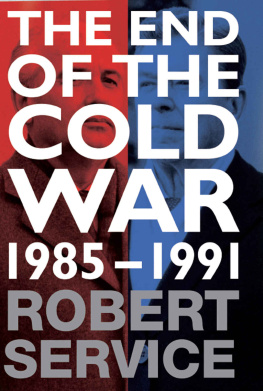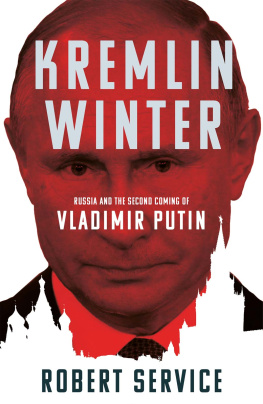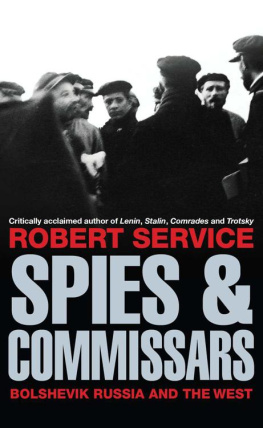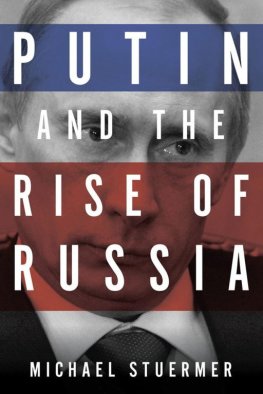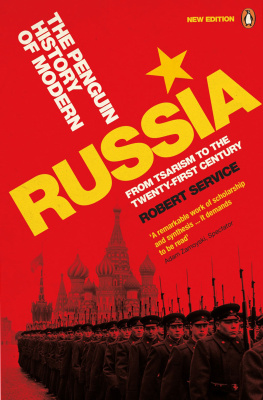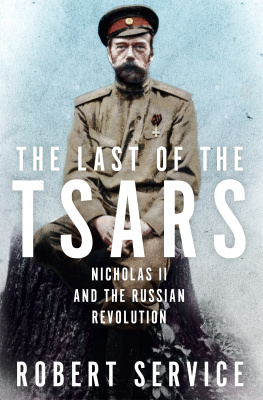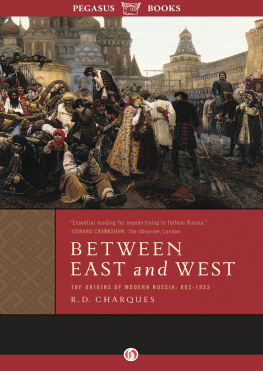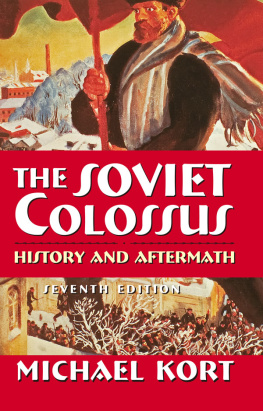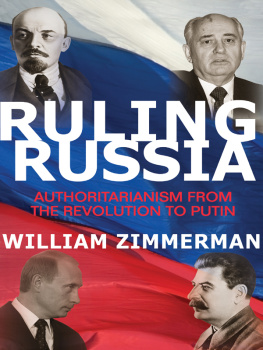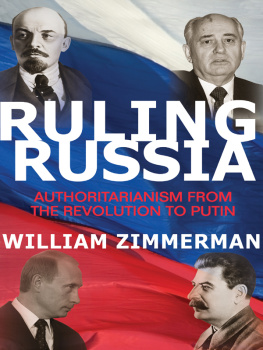Contents
Robert Service
THE PENGUIN HISTORY OF MODERN RUSSIA
From Tsarism to the Twenty-First Century
FOURTH EDITION
PENGUIN BOOKS
UK | USA | Canada | Ireland | Australia
India | New Zealand | South Africa
Penguin Books is part of the Penguin Random House group of companies whose addresses can be found at global.penguinrandomhouse.com.
First published by Allen Lane 1997
Published in Penguin Books as A History of Twentieth-Century Russia 1998
Second edition published as A History of Modern Russia, with revisions 2003
Third edition published under the current title with further revisions 2009
Fourth edition published with revisions 2015
Copyright Robert Service, 1997, 2003, 2009, 2015
Cover photograph Elliott Erwitt/Magnum photos
Cover design by Richard Green
The moral right of the author has been asserted
Maps by Nigel Andrews
ISBN: 978-0-141-98155-0
PENGUIN BOOKS
THE PENGUIN HISTORY OF MODERN RUSSIA
Robert Service is emeritus professor of Russian history at Oxford University, emeritus fellow of St Antonys College and senior fellow of the Hoover Institution. His other books include biographies of Lenin, Stalin and Trotsky, a textbook on the Russian Revolution and Russia: Experiment with a People, from 1991 to the Present as well as Comrades: A World History of Communism. He writes and broadcasts for the media and is a fellow of the British Academy.
THE BEGINNING
Let the conversation begin...
Follow the Penguin Twitter.com@penguinukbooks
Keep up-to-date with all our stories YouTube.com/penguinbooks
Pin Penguin Books to your Pinterest
Like Penguin Books on Facebook.com/penguinbooks
Listen to Penguin at SoundCloud.com/penguin-books
Find out more about the author and
discover more stories like this at Penguin.co.uk
To Adele, with love
Acknowledgements
These are unusual times to be studying Russia even by Russian standards. Archives have been opened and contacts with Russian writers are no longer difficult. Important documentary collections have been published. The need exists for the newer items of information to be incorporated in a general description and analysis.
In picking up this task, I have been very fortunate to have assistance from the following scholars who read preliminary drafts: Francesco Benvenuti, Archie Brown, Bob Davies, Peter Duncan, Israel Getzler, Geoffrey Hosking, Lszl Pter, Silvio Pons, Martyn Rady, Arfon Rees and Karen Schnwlder. Their comments have led to a very large number of improvements, and each of them kindly helped further by replying to my follow-up queries. Also to be thanked are members of the press study group at SSEES and others in London who have alerted me to interesting materials in Russian newspapers and journals: John Channon, Norman Davies, Peter Duncan, Julian Graffy, Jane Henderson, Geoffrey Hosking, Lindsey Hughes, John Klier, Maria Lenn, John Morrison, Rudolf Muhs, Judith Shapiro and Faith Wigzell.
Nor should I omit to acknowledge the value of discussions over several years with the historians Gennadi Bordyugov, Vladimir Buldakov, Oleg Khlevnyuk, Vladimir Kozlov and Andrei Sakharov. Quite apart from their professional expertise, each of them have shared insights and intuitions about Russian history foreclosed to any foreigner.
While writing some of the chapters, I had access to the Russian Centre for the Conservation and Study of Documents of Recent History (RTsKhIDNI), to the State Archive of the Russian Federation (GARF) and to the Special Archive (OA). In the first two of these three archives I found useful materials in conditions that reflected the recent political changes which have occurred in Russia, and I shall always remember the occasion in September 1991 when Bob Davies and I walked into the Russian Centre for the Conservation and Study of Documents of Recent History as it was being unsealed after the abortive August 1991 coup. Equally, I shall not quickly forget the experience shared two years later with Rudolf Muhs in the Special Archive, an institution which gave us material to read in the morning whose existence it denied in the afternoon. But in general the libraries and archives in Moscow have been as helpful as the SSEES Library in London and this is saying a lot because John Screen, Lesley Pitman and Ursula Phillips could not have done more to facilitate the research on the book.
My greatest debt is to my wife Adele Biagi, who examined the early drafts and nudged me away from the temptation to take too particularist a viewpoint on Russia. It has also been a pleasure to talk about Russian history with our daughters and sons Emma, Owain, Hugo and Francesca as they have been growing up. They read some of the chapters, and their suggestions led to several useful revisions. Russia is a source of changing but perennial fascination and it is a fascination which I hope this book will do its bit to spread.
January 1997
It is five years since this book appeared and much has changed in Russian politics, economy and society. The second edition takes the account into the twenty-first century. Most chapters have undergone minor revision and some recent works have been added to the bibliography. has been entirely re-written. The introduction has been overhauled to sharpen the focus on historiographical debate and here I was helped by comments from Adele Biagi, Archie Brown, Bob Davies, Richard Evans and David Priestland. The main lines of argument in the first edition have been repaired but not replaced.
November 2002
The events of the past few years have shaken the kaleidoscope of Russian affairs. In bringing the story and the analysis up to date I have kept the books basic line of analysis and have been fortunate in being able to talk this over with Archie Brown, Paul Chaisty and Alex Pravda in the Russian and Eurasian Studies Centre at St Antonys College in Oxford, with Katya Andreyev at Christ Church, Oxford, with Nick Stargardt at Magdalen College, Oxford and with Robert Conquest, Paul Gregory, Amir Weiner, Norman Naimark and Yuri Slezkine while I was working on research projects at the Hoover Institution in Stanford University. I am indebted to the detailed advice given by Archie Brown about the introduction and by Paul Chaisty and Hugo Service about the chapters on the past two decades. Above all, my wife Adele Biagi has given inestimable assistance by going through the entire book yet again and suggesting ways of improving on the previous edition: I am grateful to her for her patience and insight.
February 2009
I have adjusted the introduction and the chapters in the light of fresh contributions to the historiography. Katya Andreyev, Bob Davies, Mark Harrison, Christopher Read and Arfon Rees have discussed recent publications with me, and I am grateful to Bob Davies and Mark Harrison for expounding the current state of knowledge about the late 1930s economy. Access to many of the Russian archives is harder than it was in the early 1990s (even though the situation still remains freer than under the communist administration). The main addition to this edition is the chapter on the years from 2009, and I appreciate the advice on its draft from Roy Allison, Michael Bernstam, Paul Chaisty and Mark Harrison.

